Class 100 DMU images
« ‹ Page 9 of 33, displaying 161-180 of 644 images › »
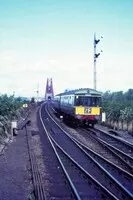
13th September 1966
An unidentified Gloucester RC&W Motor Brake 2nd leads a Metro-Cammell car off the Forth Bridge and approaches Dalmeny with the 11:30 Kirkcaldy to Edinburgh Waverley service on on 13th September 1966. From an original 35mm transparency by an unidentified photographer - an eBay purchase. Brian McDevitt Collection.

Unknown Date
A Class 100 / 101 hybrid. Both vehicles are in early variations of Rail Blue livery, the Gloucester has additional yellow as it includes the cab doors, the Met-Camm less yellow as it has just a small yellow panel (signified by the BR logo being on the cab door). Taken at Perth, date unknown. Stuart Rankin.

1967
Set: 88
A Class 100 unit at Dundee (Tay Bridge) probably on a service to Arbroath, looking north-east. Scan of a slide taken by my aunt, development date on frame is October 1967. K. Brewster.

4th March 1967
M56109 leads this GRC&W twin set at Talerddig with the 3.45pm Aberystwyth - Shrewsbury service on March 4, 1967. Michael Mensing.
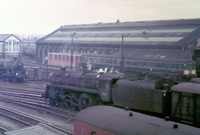
4th March 1967
A GRC&W twin DMU seen on Chester depot on 4 March 1967. The KDH Archive.
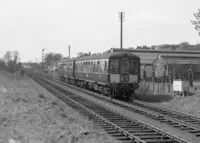
25th April 1967
Set: 82
Gloucester twin approaching Pinkhill with the SX 13:02 Corstorphine - Edinburgh Waverley on Tuesday 25 April 1967. Closest is SC50346 carrying set number 82. The 3 3/4 mile journey took 12 minutes with three intermediate stops. Stuart Mackay Collection.
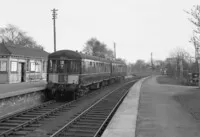
25th April 1967
Set: 79
A Gloucester twin departs Pinkhill station with the SX 13:02 Corstorphine - Waverley service (despite Princes St on blind) on Tuesday 25 April 1967. The DTCL carries set number 79, the DMBS SC50346 carried set number 82. Stuart Mackay Collection.

20th May 1967
The 3.45pm ex-Edinburgh Waverley is seen at Kingskettle on the 20th May 1967. Hamish Stevenson.

June 1967
A 100, 101 and 107 in Gourock station in early June 1967, taken on what was probably the last weekend of DMUs before the electrics took over on June 5th. Corriebob.

23rd August 1967
A GRC&W twin DMU set is seen at Aberdovey on 23 September 1967. The DMBS is in the early blue livery with small yellow panel, the DTCL is still in green. This was one of eleven of these sets that were allocated to Chester from 1966 to 1969. Stuart Mackay Collection.
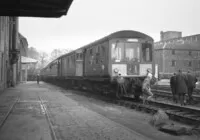
4th November 1967
The RCTS Edinburgh Local Lines DMU railtour at St Leonards on 4 November 1967 formed of two mixed livery Gloucester twins. The tour connected with their A4 tour that ran from Leeds to Edinburgh. Stuart Mackay Collection.

4th November 1967
Two Gloucester twins pass Craigentinny signal box with the RCTS Edinburgh Local Lines railtour on 4 November 1967. Stuart Mackay Collection.
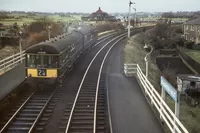
2nd December 1967
A Gloucester twin departs from Balgreen Halt on 2 December 1967 with a Corstorphine service - presumably from North Berwick. Stuart Mackay Collection.
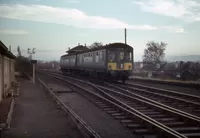
26th December 1967
On 26 December 1967 - a few days before the closure of the station and branch - a Gloucester twin arrives at Corstorphine, presumably on a service from North Berwick. Stuart Mackay Collection.

circa 1968
A Class 100 set at Dunfermline Upper, while working Dunfermline - Stiring duties. Circa 1968. Stuart Rankin.
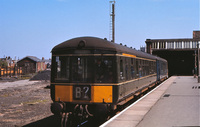
12th May 1968
Set: 75
A GRC&W twin set at Cromer station on 12 May 1968. That month the Eastern Region had received a batch of these sets moving from Leith Central to Cambridge. The DTCL shows signs of its Scottish background - the yellow first class stripe, the set number and the 'G' on the yellow panel. These were normally applied on top of the blue squares, but photos show that the blue paint used for the squares would often wash off on these sets. George Woods.

June 1968
GRC&W DMBS E51125 is working with a Met-Camm DTCL when seen coming off the viaduct that crosses the River South Tyne at Lambley whilst heading to Alston in late June 1968. Michael Mensing.

August 1968
A Class 101/100 formation departs from North Walsham station in August 1968. The DTC, which has window bars on the passenger doors suggesting it was one of the vehicles previously allocated to South Gosforth, would normally carry a BR logo on the drivers door in this livery. The door looks glossier than the rest of the vehicle, suggesting it's a replacement. Steve Davies Collection.

August 1968
A Class 100 GRC&W set seen at West Runton in August 1968. Steve Davies Collection.

11th August 1968
GRC&W DMBS E51114 working as part of a four-car set. Seen in Carlisle station on 11 August 1968 no doubt on a service from and back to Newcastle, the South Gosforth allocated vehicle is with three vehicles still in green, a BRC&W and two Met-Camms. Stuart Mackay Collection.


